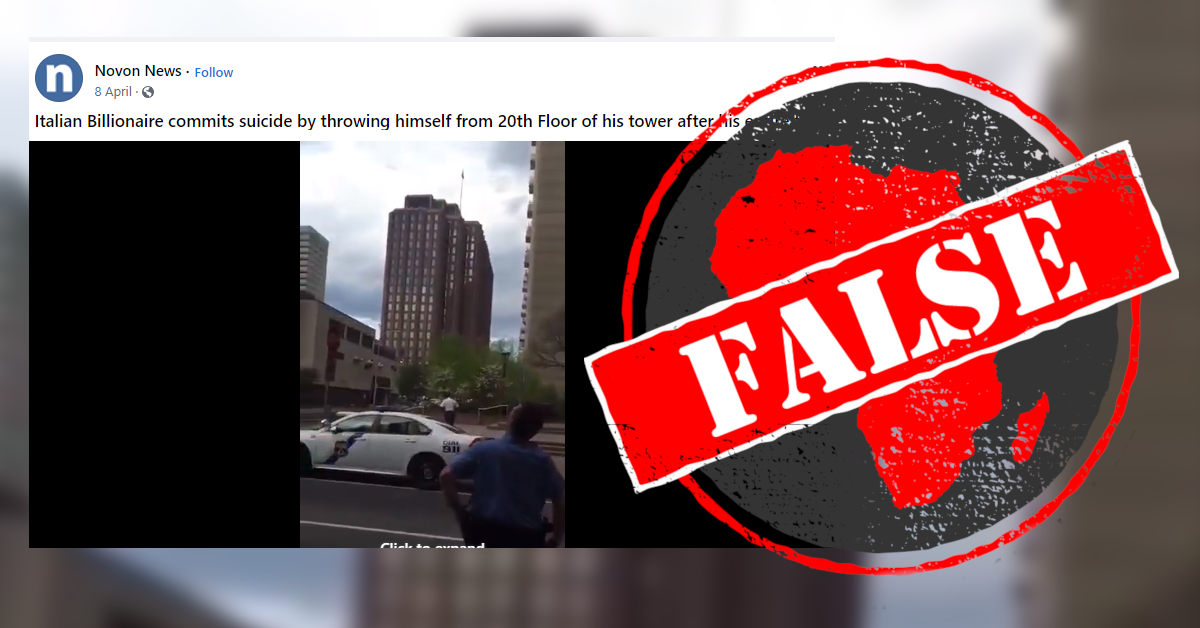A video posted on Facebook and WhatsApp in late March 2020 shows hundreds of people praying in a city square.
On Facebook, the caption reads: “In Italy, people of all religion are asking for forgiveness from Allah Almighty while prostrating to Allah.”
Italy has been particularly hard hit by the coronavirus pandemic. It currently has the world’s highest death toll from Covid-19. More than 15,800 people have died there and about 129,000 others have the disease.
Does the video show people praying in Italy during the coronavirus crisis?

The video’s narrator appears to be speaking Spanish, and refers to a “Plaza San Martin”, “nominaciones” and “Peru”.
Entering “Plaza San Martin” into Google Maps reveals it to be a large public space in Peru’s capital, Lima. A YouTube search for the keywords brings up the same video, posted by a user seeking its origins: “Please tell me what is? I tried to search but with no result.”
The video shows several landmarks that prove the event took place in Plaza San Martin in Lima, and not in Italy. These include the statue of Jose de San Martin, an independence hero, lit up at night, and concrete structures that are clearly visible during the day.
We also used the Invid verification tool to extract frames from the video for a reverse image search. This led to a 13-minute Facebook video that was streamed live by a Peruvian politician named Alejandro Muñante and posted on 7 December 2019.
The video in the claim shows the first 5 minutes and 30 seconds of Muñante’s video. The caption reads “Vigilia de oración por El Perú” which, translated from Spanish to English, means “Prayer vigil for Peru”. Muñante uploaded another video of the same event with the same caption.
Entering the keywords “Vigilia de Oracion por el Peru” into Google returned similar Facebook videos of a prayer vigil held on the evening of 6 December 2019, including by two Christian organisations. One of them, Yo Defiendo Mi Familia, uploaded several videos of the vigil, and shared a report of the event streamed by a TV show called Bethel Informa.
Another organisation, Perú, Jesucristo es la única esperanza, notified its Facebook followers about the vigil on 2 December 2020 and then streamed it live.
On 11 December 2019, five days after the vigil, Bethel Informa, which is affiliated with the Peruvian Christian broadcaster Bethel TV, ran a report about the event on its Facebook page.
Here the caption, translated from Spanish, reads: “Last Friday, December 06, hundreds of men and women of the evangelical Christian community in Peru concentrated on St. Martin Square to celebrate a united vigil of prayer and cry to God.”
Plentiful video evidence shows that the event in the video was a Christian prayer vigil that took place in Lima, Peru, on the night of 6 and 7 December 2019.
China first reported the new coronavirus outbreak in Wuhan to the World Health Organisation on 31 December 2019. The new coronavirus outbreak was unlikely to have been public knowledge in Peru in early December. – Vincent Ng’ethe
On Facebook, the caption reads: “In Italy, people of all religion are asking for forgiveness from Allah Almighty while prostrating to Allah.”
Italy has been particularly hard hit by the coronavirus pandemic. It currently has the world’s highest death toll from Covid-19. More than 15,800 people have died there and about 129,000 others have the disease.
Does the video show people praying in Italy during the coronavirus crisis?

Landmarks in Lima, Peru
The video’s narrator appears to be speaking Spanish, and refers to a “Plaza San Martin”, “nominaciones” and “Peru”.
Entering “Plaza San Martin” into Google Maps reveals it to be a large public space in Peru’s capital, Lima. A YouTube search for the keywords brings up the same video, posted by a user seeking its origins: “Please tell me what is? I tried to search but with no result.”
The video shows several landmarks that prove the event took place in Plaza San Martin in Lima, and not in Italy. These include the statue of Jose de San Martin, an independence hero, lit up at night, and concrete structures that are clearly visible during the day.
Prayer vigil for Peru
We also used the Invid verification tool to extract frames from the video for a reverse image search. This led to a 13-minute Facebook video that was streamed live by a Peruvian politician named Alejandro Muñante and posted on 7 December 2019.
The video in the claim shows the first 5 minutes and 30 seconds of Muñante’s video. The caption reads “Vigilia de oración por El Perú” which, translated from Spanish to English, means “Prayer vigil for Peru”. Muñante uploaded another video of the same event with the same caption.
Entering the keywords “Vigilia de Oracion por el Peru” into Google returned similar Facebook videos of a prayer vigil held on the evening of 6 December 2019, including by two Christian organisations. One of them, Yo Defiendo Mi Familia, uploaded several videos of the vigil, and shared a report of the event streamed by a TV show called Bethel Informa.
Another organisation, Perú, Jesucristo es la única esperanza, notified its Facebook followers about the vigil on 2 December 2020 and then streamed it live.
Evangelical Christian community
On 11 December 2019, five days after the vigil, Bethel Informa, which is affiliated with the Peruvian Christian broadcaster Bethel TV, ran a report about the event on its Facebook page.
Here the caption, translated from Spanish, reads: “Last Friday, December 06, hundreds of men and women of the evangelical Christian community in Peru concentrated on St. Martin Square to celebrate a united vigil of prayer and cry to God.”
Plentiful video evidence shows that the event in the video was a Christian prayer vigil that took place in Lima, Peru, on the night of 6 and 7 December 2019.
China first reported the new coronavirus outbreak in Wuhan to the World Health Organisation on 31 December 2019. The new coronavirus outbreak was unlikely to have been public knowledge in Peru in early December. – Vincent Ng’ethe
Republish our content for free
For publishers: what to do if your post is rated false
A fact-checker has rated your Facebook or Instagram post as “false”, “altered”, “partly false” or “missing context”. This could have serious consequences. What do you do?
Click on our guide for the steps you should follow.
Publishers guideAfrica Check teams up with Facebook
Africa Check is a partner in Meta's third-party fact-checking programme to help stop the spread of false information on social media.
The content we rate as “false” will be downgraded on Facebook and Instagram. This means fewer people will see it.
You can also help identify false information on Facebook. This guide explains how.





Add new comment